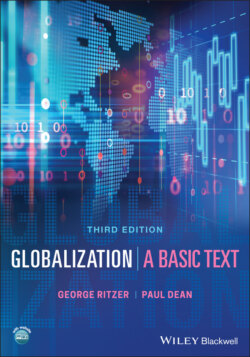Читать книгу Globalization - George Ritzer - Страница 77
MINIMIZING THE IMPORTANCE OF AMERICANIZATION
ОглавлениеIn spite of all of the evidence on the importance of Americanization, the academic literature on globalization tends to minimize or downgrade the significance of the US in global processes.
Some researchers focus on the declining importance of the US (Ferguson 2012; Hardt and Negri 2000; Huntington 2011; Preble 2018). Operating from his world-system perspective, Wallerstein offers a nuanced picture of the role of the US in the global world system, but it is dominated by images of decline. Beginning with the near-revolutionary events in the late 1960s (e.g. the student uprisings, the anti-Vietnam War movement), Wallerstein (1992) describes the US as undergoing a long-term decline that it has only been able to stem in part. He argues that “The heyday of US prosperity is over. The scaffolding is being dismantled” (Wallerstein 1992: 16). It could be argued that much of the recent well-being of the US has been built on unusually low-priced imports and that that era is ending as a result of increasing tariffs and other economic trends (Goodman 2019), although Wallerstein wrongly focused on Japan and was unable to see the economic ascendancy of China. While America will retain its military and political power, Wallerstein sees a “terrible” decline psychologically among Americans who will have a difficult time adjusting to their less exalted position in the world system.
Others see the decline of the US linked to the overall decline in the importance of the nation-state (Dasgupta 2018; Strange 1996). The declining importance of the nation-state in general, and the US in particular, is also reflected in work that focuses, for example, on the rise in the importance of transnational flows (see Chapter 4) and of global cities (see Chapter 13). Still others argue that the US’s massive debt will rapidly speed its decline (Ferguson 2012).
